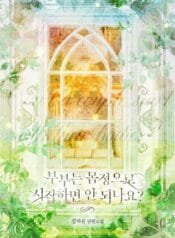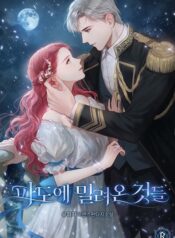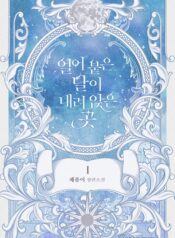Enoch came to see him late one night, as was becoming routine. When he cautiously opened the door to the bedroom, he found Ruben frozen in place, gazing at Helia as though she were the only thing in the world. Ruben didn’t react to Enoch’s presence; his eyes fixed unwaveringly on her.
“Your Grace,” Enoch called softly.
Ruben didn’t respond. Enoch sighed, the weight of the moment pressing down on him. He knew what he was about to say would only add to Ruben’s torment, but it had to be said. Now that he knew the truth, he couldn’t keep silent. He had to confess his sins, even if it meant bearing more guilt than he already did.
At first, Helia had been nothing more than a member of the royal family he thought deserved to die—an obsolete remnant of a broken lineage. She held no value to him, only serving to disrupt his master. To Enoch, Helia had been a blemish to be erased.
He had poisoned her himself. It was an act to set the distorted world right. There was no reason to feel guilty. The smooth progression of events was proof enough—everything had gone according to plan. The only flaw was that she had survived.
“But why?”
Why did his lord rush to the Star Residence from dawn, refusing to leave that woman’s side? As if he were waiting for her to wake up. Was he the only one waiting for her breath to cease?
Was it because it would be problematic if the princess were to die in the duke’s residence? At first, Enoch thought so. Yet Helia had already been discarded by the royal family. The duke’s name carried far more weight. Xeroth’s royal faction would likely exploit her death, pretending to share the duke’s grief to sway Ruben to their side rather than uncover the truth. Xeroth was that much of a coward, that powerless. Turning a well-established Ruben into an enemy wasn’t a risk they’d dare to take.
Failing to serve royalty properly was a capital offense. But executing the duke could incite a rebellion. Instead of taking that gamble, Xeroth would latch onto this weakness, keeping Ruben under control. They would remain blissfully unaware that they had invited a lion into their home. Ruben, in turn, could feign compliance, all the while waiting for the foolish king to hand him the justification for revolution. It wouldn’t take long. That much political calculation was already complete.
Moreover, being close to the king also meant being able to strike at any moment. While Ruben, in his principled way, might find this distasteful, Enoch and Ikael believed such methods were necessary.
A failed revolution is nothing but treason. The revolution must succeed first, and judgment could come later. By then, Enoch would gladly accept any punishment. Whatever it might be, as long as the revolution succeeded, his personal revenge and the organization’s goals would be achieved, leaving nothing but sweet satisfaction.
Thus, the “operation” was executed, born of such calculations. And after that, everything changed. It was as if the world had turned upside down—like the sun rising in the west or a snowstorm engulfing the southern regions.
Enoch had to uncover and report evidence that Helia was the revolutionaries’ most steadfast supporter. At first, when Ruben gave the order, Enoch thought he had lost his mind. How could it be true? The royal informant who had arrived like a godsend during a drought of information was none other than the member of the royal family Enoch despised most—the same woman who constantly unsettled his lord.
Determined to deal with the arrogant princess himself, Enoch saw Ikael’s directive as an opportunity. When he boarded the Euresica, he even felt a sense of accomplishment. But then—what?
As he traced her actions each day, Enoch could only confirm his own foolishness. The princess was meticulous, and they had been naive. She exploited gaps they hadn’t even considered. Like a stinging rebuke, he had no choice but to acknowledge the truth, as absurd as it seemed. The princess supported the revolution. And he, blinded by his vendetta, had been hell-bent on killing someone like her.
“I have something to say.”
“What is it?”
Ruben turned to Enoch, his green eyes locking onto him. For a moment, Enoch flinched. The usual steadfast and kind gaze was nowhere to be seen. His dry, desolate eyes held nothing. The dark circles under them revealed exhaustion. Ruben was worn out, and Enoch was about to add to that burden. Lowering his head, he began to confess his sins.
“It’s about the time the princess fell ill.”
Helia. Ruben remembered it vividly—how she had refused to see a physician, leaving him to watch over her every day as her condition improved.
“Do you know why she was sick?”
There was no way Ruben could know. Helia had insisted she was okay, masking her fever with feigned indifference and dismissing his concerns with a carefree attitude. Ruben had never pressed her further. If the patient claimed to be alright, observing her recovery seemed sufficient.
“It was because of the Crayon I added to her food.“
“…What?”
Ruben repeated, unable to process the words. Crayon? That infamous poisonous mushroom is known for its delayed lethal effects.
“It was my unilateral decision. At the time…I believed her presence unsettled you.”
Ruben froze.
The memory was clear—Helia, delirious with fever, gripping his hand and asking who he was. Her heat had burned into him as she moaned, and now he learned it was all because of poison?
He couldn’t fathom the pain she must have endured. Had she died then, the truth would have been buried, leaving only her infamy behind. Perhaps that’s what she wanted. If the truth had been forever obscured…
Ruben’s hand twitched toward his sword. A fierce desire to sever Enoch’s head surged through him. Sensing Ruben’s murderous intent, Enoch involuntarily shrank back. The suffocating weight of his lord’s rage made it hard to breathe. Closing his eyes tightly, Enoch braced himself for death.
But it didn’t come. Summoning every ounce of restraint, Ruben swallowed his fury. Above all, he had no right to judge Enoch.
Who could he blame? Enoch had become what he was because of Ruben. I hated you, yet I couldn’t let you go…
And hadn’t he inflicted countless wounds upon Helia, even if not with poison? He couldn’t even ask for her forgiveness. The despair was suffocating.
“Leave.”
Her punishment, as well as his own, should come from Helia herself. That was why he waited like a condemned man, hoping for her to wake.
Perhaps understanding his intent, Enoch left with a stricken expression. Ruben was alone again.
***
The days dragged on. Two more passed, bringing them to the fifteenth since Helia collapsed. She still had not opened her eyes, and Ruben had not left her side.
Then, in the stillness of another night, Ruben sensed a presence behind him. Instinctively, he rested a hand on his sword, ready to defend her. Soon, a figure appeared by the window.
“She’s still not awake?”
The voice was casual, almost flippant. Ruben frowned, keeping his wary gaze locked on the intruder.
Lina—the woman who called herself Miel Apri—sat comfortably on the windowsill, showing no intention of hiding.
“You’re late.”
“This is me coming as quickly as I could.”
Miel smiled leisurely. Her inscrutable gaze and constant smirking grated on Ruben’s nerves. Yet, it was he who had summoned her here. Suppressing his irritation, he chose to endure it.
“Still, it’s remarkable that she’s still breathing. I knew she had a resistance to poison, but I didn’t expect her to survive even Euresica,“ Miel said nonchalantly.
“…What?”
Ruben froze, unable to process what he had just heard. Resistance to poison? Helia? Why?
“Oh my, it seems our duke knows nothing,“ Miel chuckled, promptly sealing her lips as though indicating she had shared enough. Ruben’s expression hardened, but her behavior was something he had braced himself for.
“The request I made?“
Ruben’s sole request was explicit: a thorough investigation and documentation of Helia’s past actions. Separate from her ties to the revolutionaries, he sought to understand the path she had walked. When Ikael conveyed Ruben’s request to Miel, he hesitated, questioning if it was necessary. Ruben, however, remained resolute, his silence answering Ikael’s doubts.
Necessary? Of course, it was. He needed to know everything about her, even if it meant going this far. He knew nothing about her. Since she hadn’t shared anything with him, it was up to him to uncover it. Without this pursuit, he couldn’t endure the agonizing wait.
“Shall we discuss the payment first?“ Miel asked with the practiced smile of a merchant. Her words implied she was ready to deliver the requested information in exchange for the agreed price. Without responding, Ruben tossed a pouch onto the table. Miel deftly caught it and examined its contents. Her eyes widened as she recognized it.
“The Red Tear?”
The moment she laid eyes on the gem, Miel identified it. The Red Tear was a ruby necklace that had once captivated the world. The chain was crafted with diamonds and gold, and a large ruby adorned its center—a gem so vivid and massive that it had been likened to the tear of a demon. Once, a family heirloom of a noble house entered circulation after the family line ended, changing hands multiple times quickly. This sparked rumors of misfortune for its owners, drawing widespread fascination. It was sold to an anonymous buyer recently, vanishing from public knowledge.
And now, it turned out Ruben had acquired it from Effenberg. Miel’s intrigued eyes shifted back to him.
“This seems more than sufficient for the value of the information I’m selling,“ she remarked.
“It’s compensation for the trust you’ve broken by betraying a long-standing client,“ Ruben replied curtly.
The truth was the Red Tear could uncover secrets even within the emperor’s chambers. But as a seasoned merchant, Miel refrained from disclosing such details. She had indeed betrayed a long-time client in Helia, yet she swiftly revealed the source of the information Ruben sought.
“The documents you requested are already in your study,“ she informed him.
“My study?”






